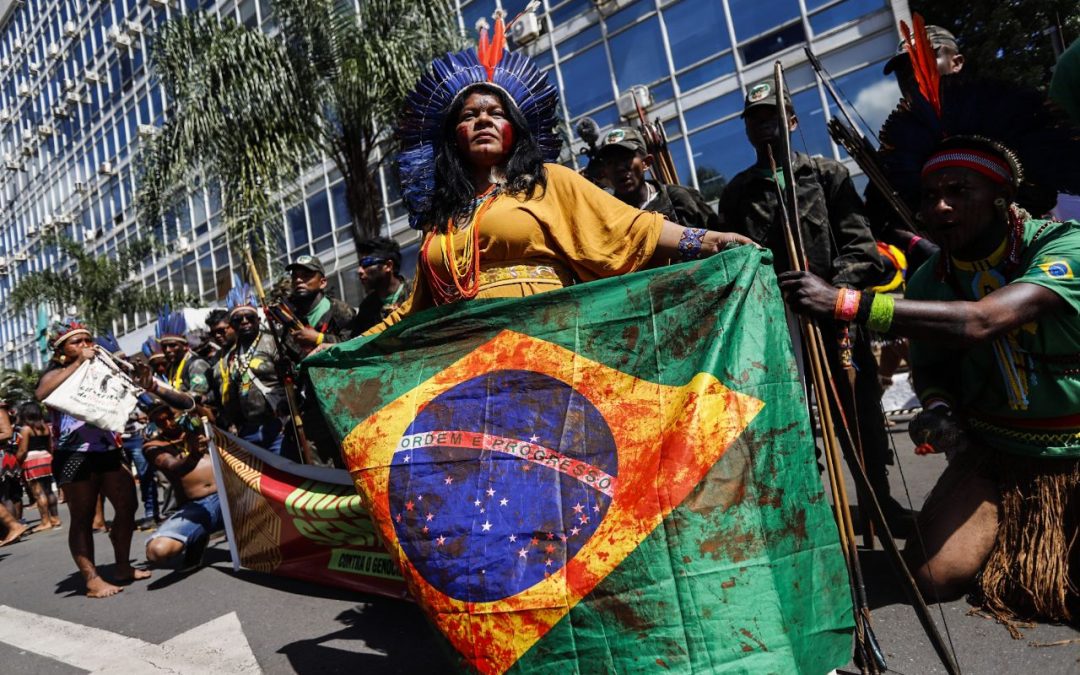
14/Dec/2019
Photo: Mídia NINJA
Another Guajajara was murdered. Erisvan Soares Guajajara was 15 years old. Son of Luécia Guajajara and Luzinho Guajajara, he was murdered in Amarante where Atibóia indigenous land is located.
The impunity keeps on runnig over many lives and racist speeches on courts keeps generating new victims.
Besides using national force as an emergencial measure, urgently of accurate public policys to access this persecution is needed. We urge for proper public policies and punishment to the deforesters, land grabbers, gold miners and to all kinds of criminials who now feel empowered to invade our territories, lands of our own by right, assured by the Federal Constitution.
We need efficient policys for inspection and the fortification of Indigenists Bodies on the contrary of this set of measurements that awards instead the invasors and land grabbers as the Provisional Measure, which is about landholding regularization in the country – published on the last 10th, or yet this set of measures which dismantles the Indigenists’ and environmentals’ organs.
We need health care policies for the ills and to prize scientific knowledge, our traditions and our tradicional knowledges. We need a singular education for the young people, children, sons and daughters, nephews and grandchildren, more Indigenous schools in our villages. We need investments in PNGATI (National Policy on Environmental and Territorial Management of Indigenous Land) and in policies developed under leaderships of our own Indigenous people.
We will stand fighting until the last Indegenous person stands, that’s how we are doing since 519 year ago. Our lives are public service for humanity. We are the ones who guarantee the air you breath, the water you drink and the balance of the planet’s climate. Without us there will not exist future for humankind. Therefore fighting for Indegenous lives is to fight for those who you love too. This fight is for all of us, it is a fight of gender, race, it’s an environmental fight, class struggles, for human rights for life.
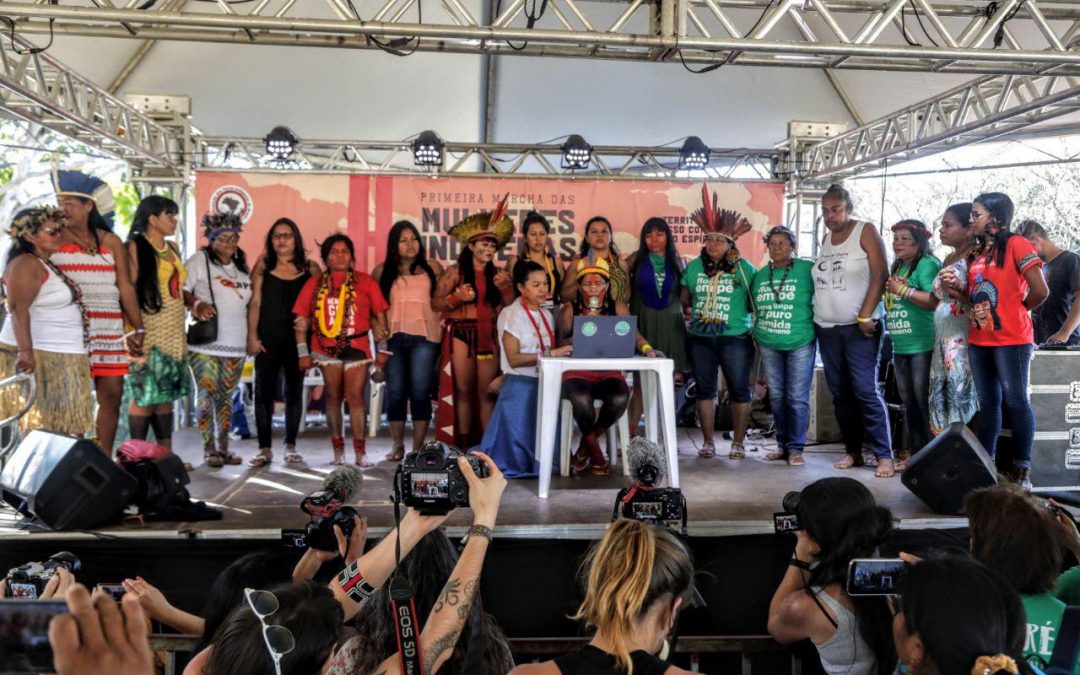
15/Aug/2019
Brasilia – Federal District, August 9 to August 14, 2019
Respect our existence or expect resistance
We, 2,500 women representing 130 different indigenous peoples from every region of Brazil gathered in Brasilia (Federal District), from August 9 to 14, 2019. We conceived this mass meeting collectively to be punctuated by the First Indigenous Women’s Forum and March. As Indigenous Women, our message to the world is that we are waging a constant struggle in defense of “Territory: our body, our spirit”. So that our voices may echo around the world, we reaffirm the commitments we made over the past days.
As women, leaders and warriors, bearers and protectors of life, we will stand and struggle against the issues and violations that afflict our bodies, our spirits, our territories. By spreading our seeds, our rituals, our language, we seek to guarantee our existence.
The Indigenous Women’s March was conceived as part of a conversation that began in 2015 to support the development and empowerment of indigenous women. Throughout these years we engaged in dialogue with women across movements and realized that our movement stands out in ways we would like to be better understood. The gestures of our combat dance contemplate the need for a return to mutual support between the feminine and the masculine, without, however, essentializing men or women. Machismo is yet another epidemic brought to us by European settlers. Thus, what non-indigenous women consider to be violence may not be what we consider to be violence. This does not mean that we will close our eyes to the violence that we recognize in our villages, but rather, that we need to consider how it developed in our communities in order to counteract, problematize and bring critical reflections about our everyday practices and contemporary forms of political organization. We need to engage in dialog and strengthen the power of indigenous women, reclaiming our matriarchal values and our historical memory so that we can advance social rights in our territories.
We are totally opposed to the narratives, proposals, and actions of the current government, which has made its intention to exterminate indigenous peoples explicit. This government has made the genocidal exploitation of our territories by capital its aim. This manner of governing is akin to pulling a tree from the ground and exposing its roots until everything dries out. We are grounded in the earth, because that is where we seek our ancestors, and the earth provides our nutrition and life. That is why for us, territory is not a good that can be sold, traded or exploited. Our territory is our life, our body and our spirit.
The fight for our territorial rights is the fight of our lives. Life and territory are one, for the earth gives us our food, our traditional medicine, our health and our dignity. To lose our territory is to lose our mother. Whoever has territory, has a mother, has a lap to rest their head on. And those who can rest their head on their mother’s lap have a cure for what ills them.
When we care for our lands, which is a natural part of our culture, we are guaranteeing the good of the whole planet, because we care for the forests, the air, the waters and soils. Most of the world’s biodiversity finds shelter on indigenous lands. That is our contribution to sustaining life on earth.
Freedom of expression in our own languages is also fundamental to us. Many of our languages are still living. They resisted the colonial violence that forced us to use a foreign language and to erase our own ways of expressing our existence. We women play a significant role in passing on the power of our ancestral knowledge by passing on our language.
We want our unique way of seeing, perceiving, being and living on our lands to be respected. Know that for us the loss of territory brings a loss of feeling, a deep sadness that harms our spirit. The feeling of our territory being violated is like that of a mother losing her child. It shows disrespect for life itself. It shows disrespect for our culture and is a disgrace to our ancestors who were responsible for creating it all. It shows disrespect to those who have died for the land. It brings the loss of the sacred and the meaning of life.
Everything that this current government stands for and has accomplished is a direct assault on our protection and care for Mother Earth, annihilating the rights that we won over centuries of struggle. The government’s non-recognition of indigenous lands, its encouragement of mining and leasing on our territories, its attempts to make environmental regulation more flexible, its moves to finance the purchase of weapons in the countryside, its dismantling of indigenous and environmental policies all demonstrate this.
Our duty as indigenous women and leaders is to strengthen and give value to our traditional knowledge, to ensure our wisdom, ancestry and culture survive, to know and defend our rights and to honor the memory of those who came before us. Our duty is to know how to wage our struggle, to give potency to our spiritual practices and to banish all that threatens our existence.
To fulfill our duty, and with the strength of the web of life and the connections that we have weaved at this meeting, we tell the world that we will fight tirelessly:
- To ensure the recognition and demarcation of indigenous lands, for the attacks on our mother earth are attacks on our own body and our life;
- To ensure our right to the full possession of our territories. We will defend our land and demand that the Brazilian state prohibit mining on our territory, which is poisoning us with mercury and other toxic substances. The Brazilian state must stop attempting to lease our lands to agribusiness and it must punish illegal invasions of our territory driven by greed. These interests want to rob us of our natural resources and use them only for profit. They have no concern for maintaining life on the planet;
- To guarantee the unrestricted right to differentiated, culturally-sensitive health care for our peoples. These services must be maintained as part of the Subsystem for Indigenous Health Care of the federal Unified Health System under the qualification of the Special Secretariat for Indigenous Health (SESAI). We fight and we will continue fighting for the public services offered by the federal United Health System (SUS) and for the maintenance and continuous qualification of the National Health Care Policy for our peoples, whether in our territories or in urban contexts.
We do not accept the privatization of our peoples’ health care services or their devolution to municipal or state governments.
We fight and we will continue to fight for the management of SESAI to be performed by professionals who have the technical and policy qualifications to understand the specificities involved in providing health care to indigenous peoples. It is not enough to have an indigenous person at the head of the agency. We need to ensure the sensitive management of all the issues that are important to us under this topic, including respect for our traditional health care practices, our traditional medicines, our midwives and ways of performing natural birth, and the knowledge of our spiritual leaders. According to our indigenous sciences, health comes not only from prescribing active ingredients, healing is the result of subjective, emotional, cultural and fundamentally spiritual interactions.
- To demand the Supreme Federal Court (STF) not to allow or legitimize any retrograde or restrictive reinterpretation of our original right to our traditional lands. We hope that, in its decision on Final Appeal 1.017.365, related to the case of the Ibirama Laklanõ Indigenous Territory of the Xokleng people, which is considered to be a precedent-setting case, the STF will reaffirm the interpretation of the Brazilian Constitution in accordance with the “Indigenato” thesis, affirming our original right to our lands. The STF must definitively exclude any possibile of acceptance of the “Indigenous Occupation” thesis that only recognizes our right to the lands occupied by indigenous peoples when Brazil’s most recent constitution was approved;
- To demand that the judiciary, which, in keeping with the principle of equality before the law, asserts our specific rights laid out in the Constitution and, accordingly, defends our right to access the justice system. Ensuring a fair and democratic society means guaranteeing the rights of all peoples, as is also provided for in the Constitution. We demand that the international treaties signed by Brazil be respected, which include among others: Convention 169 of the International Labor Organization (ILO), the UN Conventions on Cultural Diversity, Biological Diversity and on Climate Change, the UN Declaration on the Rights of Indigenous Peoples and the American Declaration of the Rights of Indigenous Peoples;
- To promote the increased representation of indigenous women in political spaces, inside and outside our villages and in all environments that are important for securing and implementing our rights. Recognizing our narratives is not enough, we must recognize our narrators. Our bodies and our spirits must be present in decision-making spaces;
- To combat discrimination against indigenous people in decision-making spaces, especially women, who are victims not only of racism but also of machismo;
- To defend the right of all human beings to a healthy, pesticide-free diet nourished by the spirit of mother earth;
- To ensure the right to a differentiated, culturally-relevant education of quality for our children and young people that respects our languages and values our traditions. We demand that the 25 proposals of the Second National Conference on Indigenous School Education, including proposed Ethnoeducational Territories be implemented. We demand that institutions such as the General Committee on Indigenous Education within the Ministry of Education be reformed to ensure our participation in forming education policy. These institutions must meet our other demands, which include improving the infrastructure of indigenous schools, training and hiring indigenous teachers, and developing culturally-relevant instructional materials;
- To guarantee public policy on indigenous matters that effectively contributes to the promotion, inspiration and guarantee of our rights. These policies must design plans, implementation and monitoring in a participatory manner, in dialogue with our organizations, and take actions that reflect the diversity and the priorities of the Indigenous Movement;
- To reaffirm the need for specific legislation to combat violence against indigenous women, culturally oriented to the reality of our peoples. Public policies need to be based on the specifics, diversity and the social context of each of our peoples, respecting our conception of family, education, age, work, and poverty.
- To continue empowering indigenous women by informing, training and raising awareness about our rights, ensuring full access for indigenous women to formal education (at the primary, secondary and university levels) in order to promote and give value to the indigenous knowledge of our women;
- Strengthen the indigenous movement by bringing together our wisdom across genders and generations;
- To combat, without compromise, racist and anti-indigenous sentiment. We demand an end to violence, criminalization and discrimination against our peoples and our leaders, including by public agents, ensuring the punishment of those responsible and reparation for damages caused. The government must commit to protecting our lives.
Finally, we reaffirm our commitment to strengthen alliances with women from all sectors of society in Brazil and around the world, from the countryside to the city, from the forest to the sea. All of our rights and all of our livelihoods are under attack.
We have a responsibility to sow, transmit, transcend and share our knowledge just as our ancestors and all those who preceded us did. They helped to strengthen us together and on an equal footing with men, who we bore as sons. They gave us the strength to fight, make decisions and care for our land.
We are responsible for fertilizing and maintaining our sacred soil. We will always be warriors in defense of our peoples’ existence and of Mother Earth.
Brasilia (Federal District), August 14, 2019.
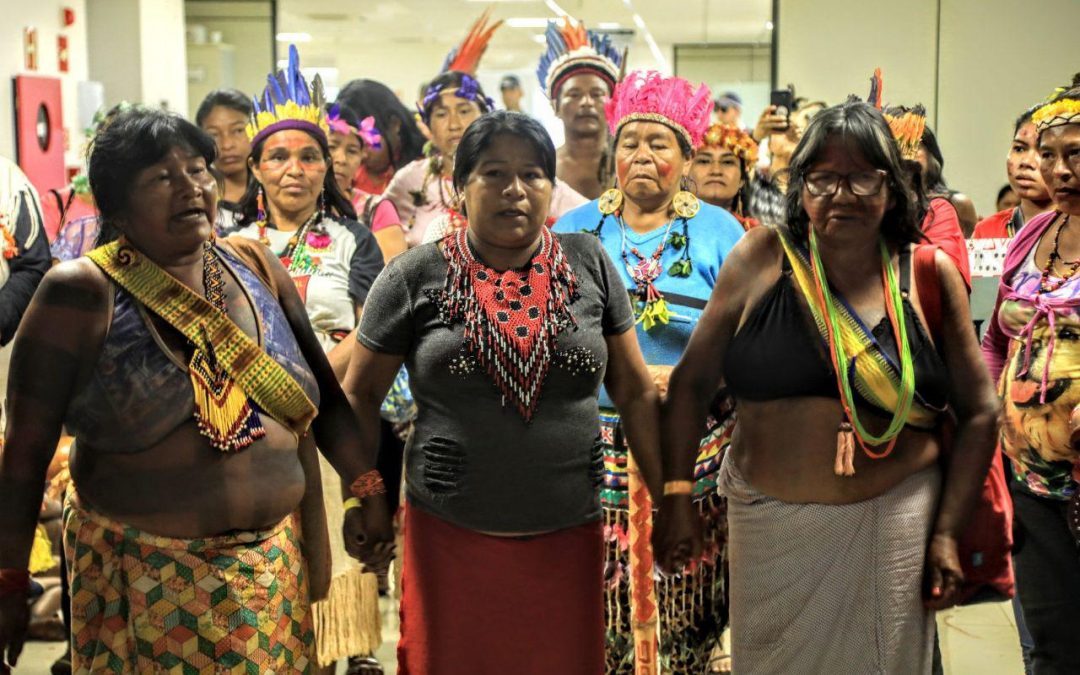
13/Aug/2019
On August 9, 2019, International Day of the World’s Indigenous Peoples, we indigenous women left our communities for Brasilia. We are nearly 2,000 indigenous women raising our voices and those of countless others in defense of our territories. We are gathered in the Brazilian capital centering women’s leading role in our history and our empowerment throughout the First Indigenous Women’s March, the theme of which affirms and strengthens our identity – “Territory: our body, our spirit.”
We are also here to express our deep indignation and vehement repudiation of the Bolsonaro government and its proposals to dismantle the institutions and social policies that deal with our people. At this time in particular we raise our voices against the dismantling of the National Policy on Indigenous Health Care.
The 1988 Federal Constitution recognizes our right to our own “social structures, customs, languages, beliefs and traditions” and our “original rights over the land” that we have traditionally occupied. It therefore ensures our right to specific and differentiated public policies.
However, President Bolsonaro insists in his authoritarian manner on abolishing these fundamental rights won in the transition to democracy. This is the aim of Provisional Measure 890 replacing the “More Doctors” program (Mais Médicos) with a new program known as “Doctors for Brazil.” In reality, the goal of this new policy is to privatize the services offered by the Unified Health System (SUS), including those offered as part of the National Policy on Indigenous Health Care.
In Provisional Measure 890, the Bolsonaro Government also proposes to establish an new social service agency called the Agency for the Development of Primary Health Care (ADAPS). This new bureaucracy serves as an absurd justification to open up primary care as a new market for the private sector to exploit.
Among other functions ADAPS will serve to:
1) provide primary health care services covered under the scope of SUS;
2) develop education, research and other activities that integrate teaching and service;
3) promote the development and incorporation of health care and management technology, responsibilities that go beyond hiring doctors in vulnerable and remote areas; and
4) the agency’s structure and principles lay the groundwork for privatizing these services, training, research and other activities provided under the scope of primary care.
Impacts on Indigenous Health
– Provisional Measure 890 excludes all the structures that provide for public input and participation within SUS. The composition and supervision of ADAPS includes no representation from the civilian National Health Council (CNS), much less that of indigenous peoples. However, the measure guarantees the participation of private entities.
– The proposal would bring about major structural changes to how health care in Indigenous Special Health Districts (DSEIs) is carried out and organized, as the Special Secretary on Indigenous Health’s work focuses on primary care. This means that most of its work would fall within the scope of this new, unaccountable agency.
It is important to stress that the proposal has not been discussed or presented in any consultation with our peoples. Further, the proposition of creating a separate social service agency dealing with indigenous health care has already discussed at length. The former government proposed creating a National Institute of Indigenous Health (INSI) in 2014, and our representatives debated and ultimately rejected the project. Now we are rejecting the privatization of the indigenous health subsystem.
Given these facts and the Bolsonaro government’s attacks against us, we INDIGENOUS WOMEN, on this day, August 12, decided to occupy the Special Secretariat of Indigenous Health (SESAI), reaffirming the position of our peoples against any prospect to devolve indigenous health care to the local level or to privatize these services. We also repudiate attempts to commercialize our wisdom and traditional knowledge. We are against all threats and attempts to negotiate over our way of life.
We reaffirm our commitment to continue the struggle in defense of our territories, our wisdom and traditional knowledge, and to specific and differentiated policies for our communities, especially in the areas of health care and education.
We also reaffirm our commitment as indigenous women from all over Brazil that we will not be quiet, we will not back down, and we will not give up fighting for lives and for our future.
We will keep on MARCHING… Territory: our body, our spirit!
Brasilia – Federal District. August 12, 2019.
BRAZILIAN INDIGENOUS PEOPLES’ ARTICULATION – APIB
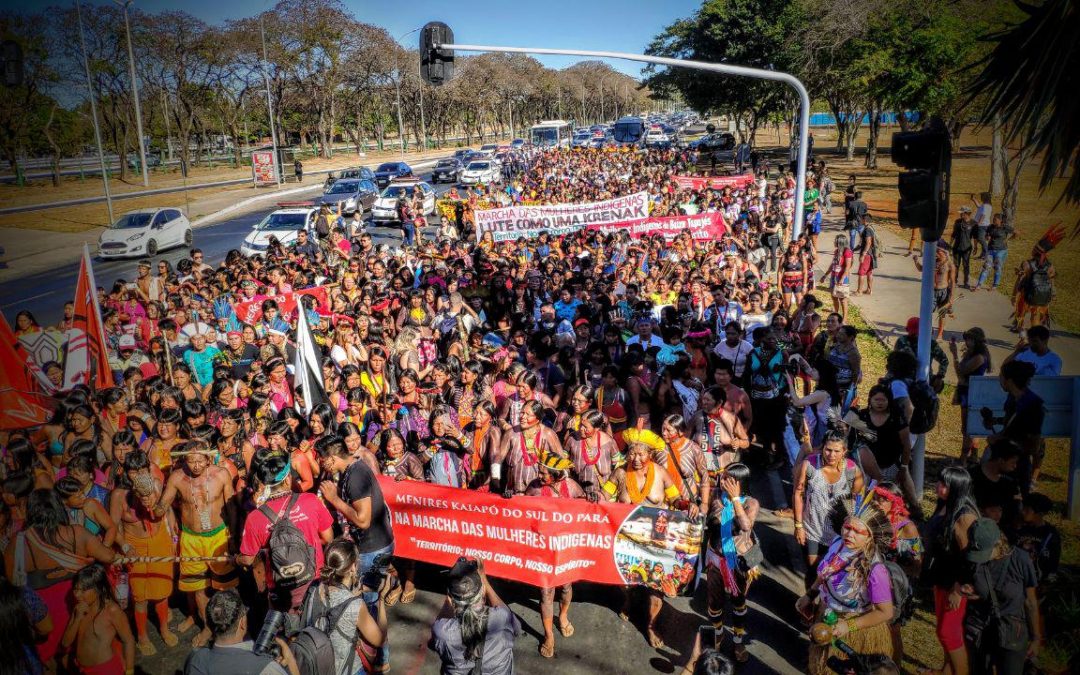
12/Aug/2019
By Luma Lessa for Collaborative Coverage of the Indigenous Women’s March (translated by Daiara Tukano
Sunday (08/11) dawned with the cultural presentations of women’s delegations from over 100 indigenous peoples from all over Brazil. Then about 1,500 indigenous women gathered for the activities of the Indigenous Women National Forum. Sonia Guajajara opened the event by inviting women from 21 states to talk about the theme: “Territory: our body, our spirit.” The discussions addressed the building of concrete demands and strategies of indigenous women for their empowerment, the violation of health, education and security rights, the right to land and resumption processes, and the occupation of indigenous women in politics.
In the afternoon, tables brought guests to discuss networking between movements. Joenia Wapichana, Federal Deputy (Rede-RR), indigenous women from Latin America, indigenous representatives from Peru and Ecuador, and a representative of UN Women Brazil attended the meeting. There was also the roundtable for National Alliances, which was attended by representatives of the Brazilian Articulation of Indigenous Peoples (APIB), the March of Daisies, Black Women, Brazilian Women’s Articulation (AMB) and the National Coordination of Quilombola Rural Black Communities (CONAQ).
In Monday (12/08) the focus is the “Indigenous Women in Defense of Indigenous Health SASI-SUS” Act. The march left the headquarters of the camp in Funarte towards the Special Secretariat of Indigenous Health (Sesai). The first walk of the 1st Indigenous Women March took to the streets of Brasilia to protest the end of The indigenous Health System municipalization and the immediate departure of Silvia Nobre, current coordinator of the SESAI. The arrival at the secretariat faced the attempt of the Military Police to block the entrance of the indigenous leaders to the building. However, the women managed to enter and occupy the space. The day ends with the participation of a women’s delegation in the hearing, scheduled to start at 17h, in the Supreme Court (STF).
The walk continues tomorrow, August 13th, at 7:00 am with the departure from the Indigenous Women’s March from the main camp at FUNARTE towards the Esplanade of Ministries. The March joins the National Act Against Dismantling of Public Education, scheduled for 9am. At the same time will take place the Solemn Chamber of Deputies with the Daisies. In the afternoon, there are workshops and activities with the Daisies in the City Park, followed by the opening of the Daisy March at 19h in the same place.
The Indigenous Women March ends on Wednesday (14/08), joining forces with the March of Daisies in a joint walk. The daisies and indigenous meeting will take place at Funarte. The expectation is about 100 thousand people for the March 13 and 14 August. The last activity of the day, scheduled for 2 pm, will be the Plenary for the approval of the Final Document with the theme “Watering Seeds: The Future of the Forum and the Indigenous Women March”. In the end, delegations return to their places of origin renewed with the forces and strategies shared between indigenous women of diverse peoples and with peasant women in these intense days of mobilizing the largest female action in Latin America.
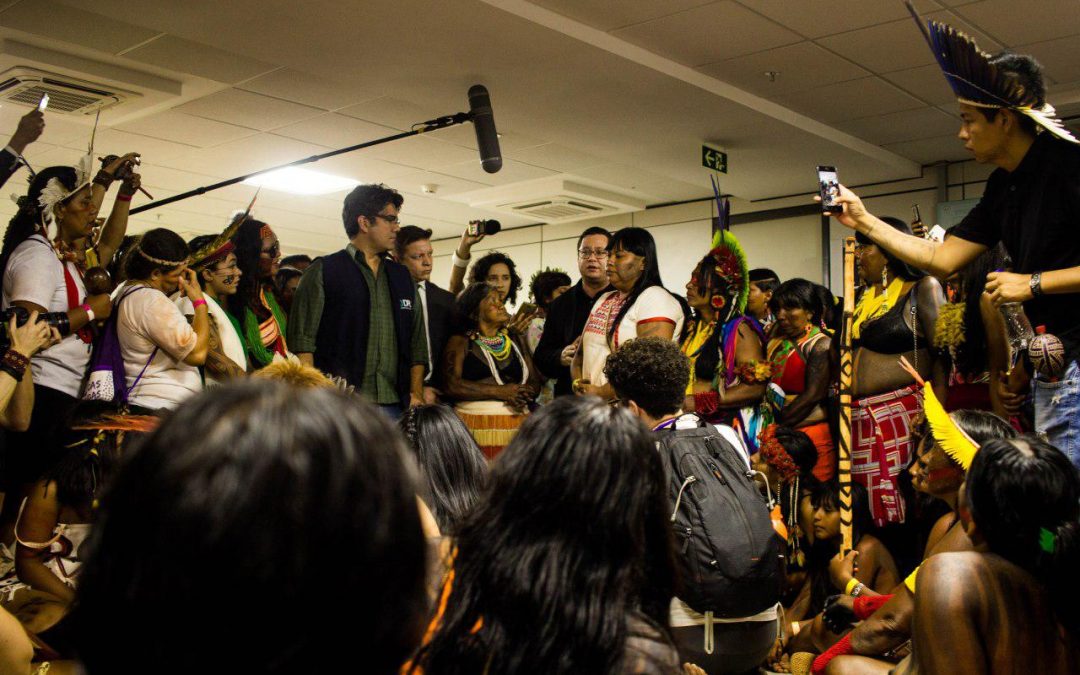
12/Aug/2019
By Andressa Santa Cruz, and free translation by Mahe Maia, for Collaborative Coverage of the Indigenous Women’s March
Hundreds of indigenous women occupied the building of the Special Secretariat of Indigenous Health (SESAI) today in Brasilia, calling for an end to the dismantling of indigenous health and the immediate departure of coordinator Silvia Nobre Wajãpi who declined to meet with the leaders and left the building under crowd boos. “Silvia does not represent the majority of indigenous women. We came here to talk and were not received. This shows the contradiction.”says Celia Xakriaba.
Since Silvia Nobre was designated by the current government in April, indigenous health policies have been weakened. The delay to transfer funds, the dismantling of the“More Doctors”Program, and the termination of the management team, impacted the villages since the first month, when indigenous across the country began to mobilize against the scrapping. In July, 115 indigenous camped in the SESAI building for two weeks and only left on the 22nd, after a meeting mediated by the Federal Prosecutor’s Office and Funai, in Brasilia, when the Ministry of Health and SESAI signed an Adjustment Agreement of Conduct (TAC) committing to accomplish the demands.
For Nyg Kaigang, from the south of the country, one of the objectives is the revitalization of the organ, “we will strive to ensure a specific health care based on the alignment of knowledge of traditional medicine, the way we think about the healing of our bodies”.
Check the moment of entry into the building:

Indigenous women occupy Sesai building demanding the immediate departure of coordinator Silvia Nobre. Photo: Douglas Freitas

Indigenous women occupy corridors and rooms of Sesai – Special Secretariat of Indigenous Health in Brasilia. Photo: Douglas Freitas / Collaborative Coverage

Indigenous women occupy Sesai building demanding the immediate departure of coordinator Silvia Nobre. Photo: Kamikia Kisedje / Collaborative Coverage

Indigenous women occupy corridors and rooms of Sesai – Special Secretariat of Indigenous Health in Brasilia. Photo: Lia Biachini / Collaborative Coverage

Indigenous women occupy Sesai building demanding the immediate departure of coordinator Silvia Nobre. Photo: Kamikia Kisedje / Collaborative Coverage

Indigenous women occupy Sesai building demanding the immediate departure of coordinator Silvia Nobre. Photo: Kamikia Kisedje / Collaborative Coverage

Indigenous women occupy Sesai building demanding the immediate departure of coordinator Silvia Nobre. Photo: Daniela Huberty / Collaborative Coverage
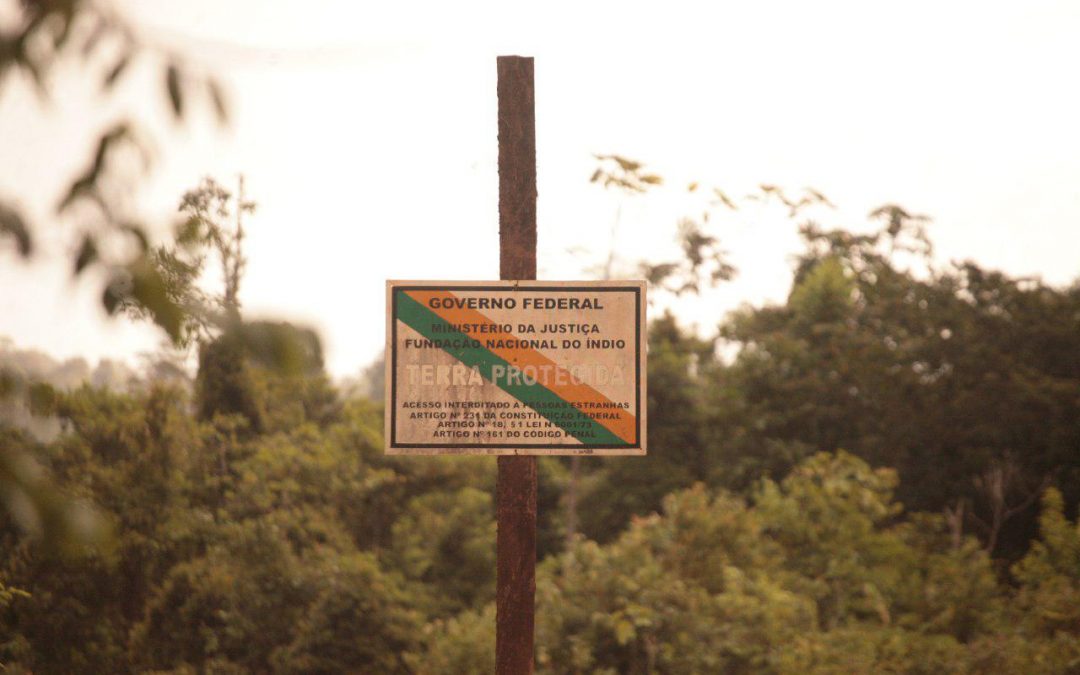
31/Jul/2019
We, members of the Wajãpi Village Council, would like to share new information about what is happening in our Indigenous Land and ask once again for support from either the Federal Police or the Army to ensure the safety of the Wajãpi people.
Yesterday (07/30/19), we received a visit from Senator Randolfe Rodrigues during the morning. He came to hear our perspective about what is happening in our Indigenous Land and asked for better clarification on some information he has received.
The senator declared he will keep on supporting us so that the police can continue investigating the invasion until they arrest the invaders. He also said we should stay in the Wajãpi territory, protecting our communities until we are sure the attackers are no longer inside. Moreover, he invited some Wajãpi people to the physical location of the Federal Prosecution Service to report what they saw and what they know about the invaders.
Last evening, we received some information from the residents of the CTA village, located on the limits with the BR 210 highway. Around 6 pm, a young man from that village went to bathe in the stream nearby the village and heard someone shouting “Hey!” from behind him. When he turned around, there was a tall, strong man with long curly hair and beard pointing at him with a weapon that looked like an automatic 12-gauge shotgun. He got very scared and ran back to the village to call someone for help. Right after that, he returned to the stream with five other men but they no longer found the invader. They found two pairs of barefoot footprints, each of them going in a different direction. They took some pictures and made some videos to present to the police. They decided, however, not to follow the tracks because it was getting dark. According to the young one, the man with the shotgun was wearing a long sleeve black t-shirt.
After receiving this information from the CTA residents, people from other villages by the highway got together to guard the entire portion of the highway located inside the Wajãpi Indigenous Land limits over the night.
This morning, CTA residents found new tracks of two people near the village and warned the other settlements. The residents of the villages by the highway formed groups to search for the invaders. They are still searching.
We, the Wajãpi people, would like to use this note to thank for the great support we are receiving from the organizations of our indigenous movement, such as APOIANP, COIAB, APIB, AIM, Hutukara, CIR, FOIRN, Senator Randolfe Rodrigues, former Senator João Capiberibe, MP Joênia Wapixana, from support organizations as our partner Iepé, CIMI, other civil society organizations like OAB, Association of Judges for Democracy, Brazilian Association of Anthropology, Brazilian Archaeological Society, Greenpeace, WWF, Pan-Amazonian Ecclesial Network and many others. Not to mention the UN, the Organization of American States (OAS) and people from all over the world.
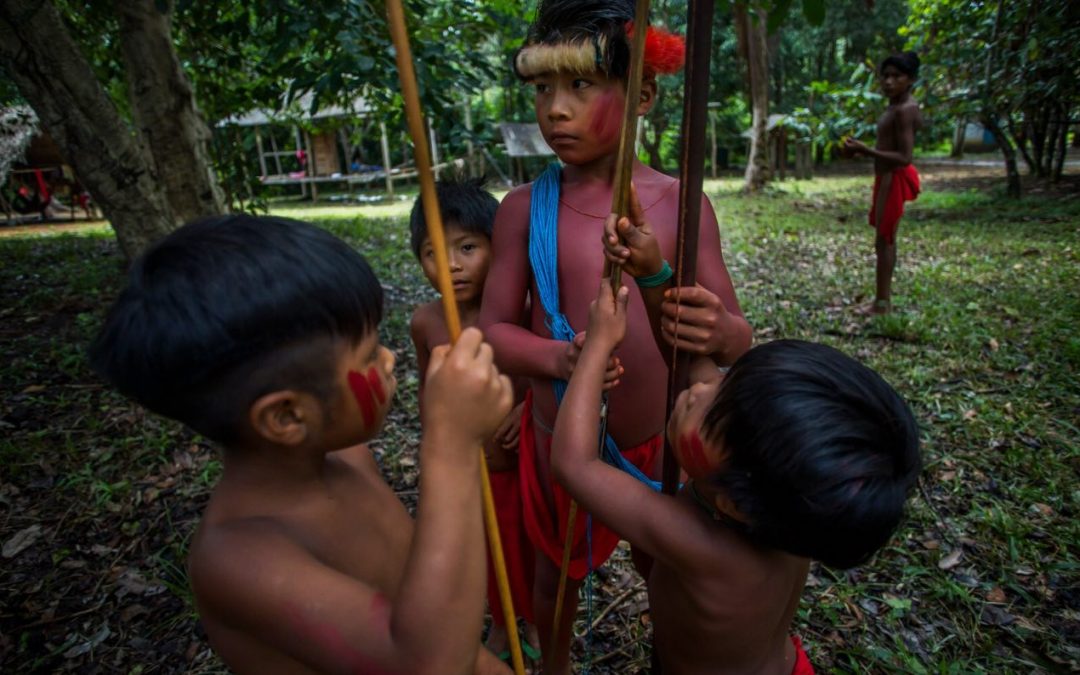
28/Jul/2019
UNITE TO ORGANIZE, STRENGTHEN TO CONQUEST!
COIAB NOTE AGAINST ATTACKS ON THE WAIÃPI PEOPLE.
The Coordination of Indigenous Organizations of the Brazilian Amazon – COIAB, together with its state, regional and local grassroots organizations, mainly together with the APOIANP (Articulation of the Indigenous Peoples and Organizations of Amapá and Northern Pará), come out to publicly express their full solidarity and support for the Waiãpi indigenous people given the recent events of gold miners’ invasion in their territory. Meanwhile, we are expressing our deep and vehement repudiation against this kind of action and which has been intensified, mainly fomented by the intransigent, irresponsible, authoritarian, prejudiced, arrogant and disrespectful declarations of the present government, especially of the Republic President Jair Bolsonaro , with the attacks he has been making against indigenous peoples’ rights in this country, especially against territorial rights already guaranteed in indigenous lands, completely demarcated and regularized in the 1989’s Federal Constitution, and which this government has been constantly trying to back down.
Indigenous peoples who inhabited this country at the time of Brazil’s invasion and who lived free in all its length, today must occupy territories delimited under the juridical figure of indigenous lands, which should at least guarantee adequate conditions for the survival and maintenance of indigenous peoples’ forms of society and culture. However, there are numerous threats to the full enjoyment of already demarcated and approved lands and even greater are the invasions of these territories. These problems have been faced by indigenous peoples since the sixteenth century, when the European invasion and geopolitical occupation of our territory, mainly motivated by economic projects unrelated to the needs and desires of the original peoples in that century. The invasion for prospection in the indigenous territories, mainly in Amazon, has been happening without any state control and despite the impact in indigenous communities. The Yanomami case is an example where thousands of gold miners, since the 1980s, have been invading their lands, located on the Brazil-Venezuela border, leaving a trail of death and destruction that still haunts that region to this day.
This week’s case in the Waiãpi Indigenous Land of the invasion of gold miners in their already demarcated and approved territory since the 1990s, as well as several other recent cases, are scenes already seen for a long time as well recently. We can emphatically attribute and associate these new attacks on indigenous territories, whether for prospection, logging, land grabbing or any other kind of illicit act in indigenous territories, to the greatest enemy of indigenous peoples today, the President of the Republic Jair Messias Bolsonaro and his anti-indigenous ministers and allies, which they systematically come since the time of his campaign until now in his 7 months of government, attacking indigenous peoples, criminalizing indigenous leaders and organizations legitimately representative of these peoples, co-opting and playing indigenous against indigenous peoples and trying at any cost to usurp social and territorial rights guaranteed to the indigenous population; arming the enemies of the indigenous peoples at the base and intensifying the conflict in the territories – all with the unique and exclusive goal of privileging the historical invaders of the indigenous lands, their political allies and the enemies of indigenous peoples, for the illegal exploitation of our lands, with the old discourse of “social and economic development of the country”.
We emphasize our obstinacy in remaining firm in the fight for the defense of rights of indigenous peoples through our indigenous organizations and leaders from our base in the Brazilian Amazon, emphasizing that we are willing to face everything and everyone in the defense of our territories, reinforcing here all our support to the Waiãpi indigenous people, their organizations’ local representatives and APOIANP, stressing all our necessary support to face this situation and demand from the municipal state and federal public authorities the immediate intervention in this situation, aiming to guarantee Waiãpi people’s and territory’s safety, avoiding further aggravation and conflict in the region.
Manaus/AM, July 28, 2019.
FOR THE DEFENSE OF INDIGENOUS PEOPLE AND TERRITORIES.
FOR SUPPORTING THE WAIÃPI PEOPLE
FOR THE LIVING WELL OF INDIGENOUS PEOPLE
12/Jul/2019
Indigenous leaders from the South and Southeast of Brazil occupied the Ministry of Health in the fight against the dismantling of the Indigenous Health policies and for the dismissal of Silvia Nobre, the current National Secretary. Today several points are blocked in the South and Southeast regions, with new blockades expected in other areas of the country, while the leadership group remains in the Ministry of Health in Brasilia. The National Secretary appointed by Bolsonaro’s Government as the first indigenous person to occupy this role, does not know, does not respect, does not dialogue with indigenous peoples, and has been acting in an authoritarian way, as it is the characteristic of this government. We will not accept the dismantling of our indigenous health subsystem that was won by us.

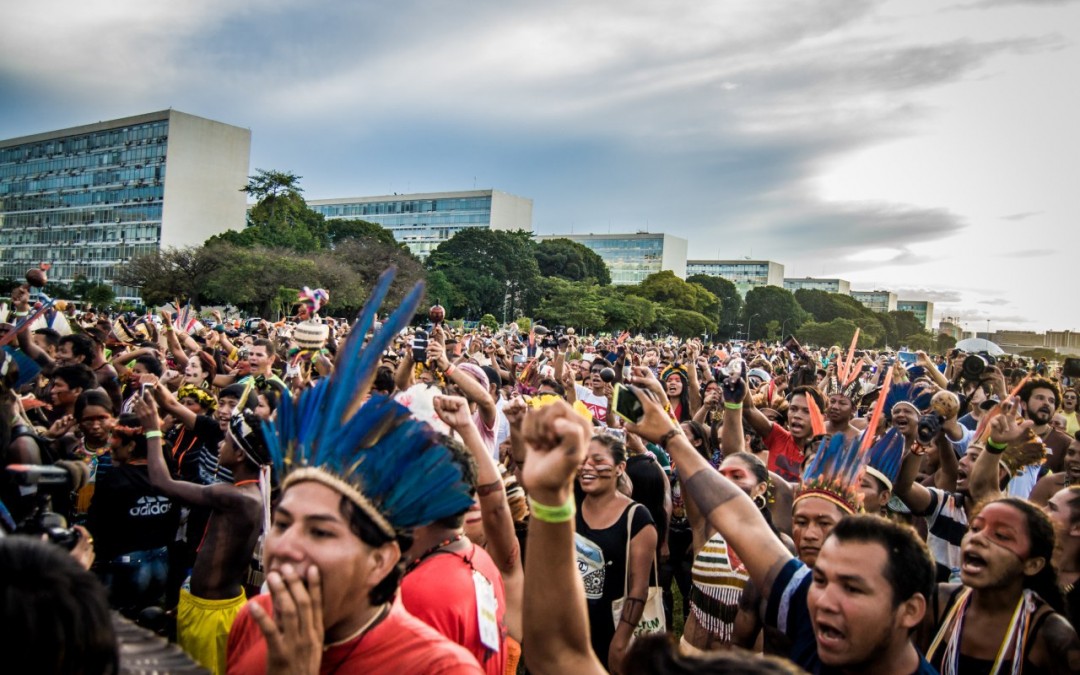
29/Apr/2017
Indigenous mobilize in record numbers in a display of democracy to the government that works to end native Rights.
The 14th Free Land Camp (Acampamento Terra Livre – ATL) ended today (4/28) in Brasilia, after days of intense activities and protests. The results were historical. More than four thousand indigenous, originating from 200 communities throughout the entirety of Brazil, were present displaying the force of the indigenous movement. The initial balance was that approximately 1.6 thousand individuals would come the nation’s capital for the event. Today we can observe that this was the largest ATL ever.
“We affirm that we will not tolerate violence, loss of rights or threats perpetrated by the Brazilian State and by economic oligarchs acting against our lives and our rights. We also call upon all of the Brazilian society as well as the international community to join the fight of the original peoples in defending traditional territories and mother nature, for the good of all living beings” states the camp’s final document.

Photo: Mídia Ninja / MNI
The document was received by the Federal House and the Ministries of Education, Health and Justice. The indigenous movement, however, has refused to participate in meetings requested by the Minister of Justice, Osmar Serraglio, and by the Government’s Chief of Staff, Eliseu Padilha. The two are ruralist politicians and the main proponents of measures against indigenous rights within the Federal Government.
Throughout the week, also due to pressures caused by the mobilization, the National Indigenous Fund (Funai) published reports identifying four Indigenous Lands belonging to the Guarani people, one in Paraty (RJ) and another three in Vale do Ribeiro, in São Paulo, as well as one land of the Pipipã people, in Pernambuco. All in all, the areas represent territories corresponding to 70 thousand hectares.
The Brazilian indigenous movement has consolidated unity on its fight and has been forming an international alliance with indigenous leaderships of six countries (Panama, Costa Rica, Guatemala, Ecuador, Bolivia and Indonesia). It has strengthened protagonism among indigenous women and youth and has received support from other social movements in the country. It has also disseminated indigenous culture and its demands like never before, leaving a tough message for the Temer government: “we do not accept attacks on the rights of original peoples.”

Ana Terra Yawalapiti. Photo: Mídia Ninja / MNI
Over the last four days, work groups discussed, among other themes, the pause in demarcation of indigenous lands; the weakening of public policies and institutions supporting indigenous issues; anti-indigenous legislation being proposed in Congress; the “Time Frame” thesis which considers indigenous lands to be only those that were controlled by indigenous communities at the time the Constitution was promulgated (on October 5th, 1988).
Coverage of the camp made by indigenous communicators and partners reached 8.5 million people on social networks throughout the week on the movement’s official page alone. National and international press disseminated the march of thousands of indigenous in Ministries’ Esplanade, main access to government buildings in Brasilia, and published images of the “Demarcation Now” image on banners held up high in front of Congress. Today, the world is more aware of the plight of indigenous peoples in Brazil.
At the beginning of the week, a music video was released showcasing the participation of more than 25 renowned Brazilian artists which was entitled “Demarcation Now”. In the video were artists such as Maria Bethania, Gilberto Gil, Ney Matogrosso, Chico César, Carlos Rennó, Lenine, Nando Reis, Zeca Baleiro, Letícia Sabatella, Elza Soares, Zeca Pagodinho, among others.

Katãn Kaingang baby. Photo: Luíza Calagian / MNI
The ATL also taught a lesson in democracy to the Temer government. On Tuesday (4/25), on its first march of the week, indigenous were received with teargas and rubber bullets in front of Congress. On the next day, they were prohibited from entering the Senate to watch a public hearing and were intimidated by police on the way to and from the camp. In spite of this, on Thursday (4/27) the indigenous held another peaceful march in the center of Brasilia to show their indignation with the treathening and the loss of rights.
For all this motives, the 14th Free Land Camp was a milestone in the fight for and defense of indigenous rights. And the fight goes on.

20/Apr/2017
There are only a few days left for the beginning of the Free Land Camp 2017. The entire program aims to bring together in a large assembly leaders of indigenous peoples and organizations from all regions of Brazil to discuss and position themselves on the violation of the constitutional indigenous rights and the anti-indigenous policies of the brazilian State. Check out the complete grid:
Monday (April 24th)
9am – Free Conference on Women’s Health
Location: Indigenous Peoples’ Memorial
9am/6pm – Presidents of CONDISI Forum
Location: SESAI – 510 North
6pm – Dinner
Location: ATL
7pm – Opening Plenary
Location: ATL
8:30pm – Documentary: ‘Preconstituinte’
9pm – Publication Launch (Unified Report): UN special Rapporteur to the indigenous people; Rapporteur about indigenous rights (Dhesca Platform) and parallel Report to the RPU.
Location: ATL
10:30pm – Surprise artistic presentation
Location: ATL
**All day: Delegations arrival and camp set up
Tuesday (April 25th)
6am/8:30 am – Cultural Activities: singing, dancing and body painting
Location: Delegation tent
7am – Breakfast
Location: ATL
8am – Opening Plenary – welcoming dancing and singing
Location: Main tent
8:30am – Opening Plenary with traditional leaders from the 5 regions
9am/1pm – Seminar “Indigenous Peoples and Original Rights”
Location: Ministério Público Federal
10am – Debate on threats to indigenous rights in the three branches of government
Location: ATL
- Executive Power: Deconstructing the institutions and public policies directed to indigenous people (the paralyzation of demarcation, the dismantling of Funai and Sesai, decrees, etc.).
Participants: Weibe Tapeba and Adriana Ramos
- Legislative Power: anti-indigenous legislative initiatives (Inquiry Parliamentary Commission – CPI; Law Proposals – LP; Constitutional Amendment Proposals – CAP; Legislative Decree Proposals – LDP).
Participants: Sônia Guajajara and Maurício Guetta.
- Judiciary System: “Time Frame” thesis, judicialized demarcation processes; Repossessions of Property; denial of Access to Justice rights; criminalization of leadership.
Participants: Valéria Buriti and Adelar Cupsinski
1pm/2pm – Lunch
Location: ATL
3pm – Guidance for the march
3:30pm – March / National Congress Act
6pm – Dinner
Location: ATL
6pm/7pm – Terra Livre Audiovisual show
7pm/8pm – Monologue Theatre Piece: Gavião de Duas Cabeças
8pm – Indigenous Women Plenary with Angela Kaxuyana and Samanta Xavante
11pm – Cultural Activities
Wednesday (April 26th)
6am/8:30 am – Cultural Activities: singing, dancing and body painting
Location: Delegation tent
7am – Breakfast
Location: ATL
7:30am – General Plenary – welcoming, dancing and singing
Location: Main tent
8am – Plenary: Themed Work Groups Guidance
Moderator: Ceiça Pitaguari and Marivelton Baré
9am – Themed Work Groups
* Indigenous Lands and Territories (land situation, indigenous land demarcation)
* Enterprises that impact indigenous territories (Right to consultation and Free, Prior and Informed Consent (FPIC), consultation of community protocols).
* “Time Frame” thesis; right to access justice; indigenous communities and the criminalization of leaders
* Indigenous Health / Indigenous Health Special Secretary (SESAI): background, current situation of the special policy and prospects.
* Indigenous School Education: past, current and prospective situation of the special policy
* Indigenous legislative proposal, national and international (Law Proposals – LP, Constitutional Amendment Proposals – CAP, International Treaties).
Note: In addressing the themes, consider the basic text of the ATL and the proposals deliberated by the First National Conference of Indigenous Peoples (I CNPI).
12am – Lunch
2pm/3:30pm – Plenary: sharing the conclusions of the Themed Groups
Moderator: Dinaman Tuxá and Nara Baré
3:30pm/6:30pm – Debate and ways forward
Note: Invited participants for the plenary: government authorities; members of the Parliament; Jurists and MPF representatives (participants in the Seminar “Indigenous Peoples and Original Rights”).
External
2pm – Public Hearing at the CDH of the Federal Senate, with the participation of a commission of 80 to 100 leaders representing the ATL.
** Table: Kretan Kaingang; Lindomar Terena; Eliseu Lopes; Paulinho Guarani; Paulo Tupiniquim; Sônia Guajajara and Darã Tupi-Guarani
Location: Federal Senate
6pm – Dinner
6pm/9pm – Terra Livre Audiovisual Show
9pm – ‘Demarcação Já’ Concert with indigenous and non indigenous people
Thursday (April 27th)
6am/8h30am – Cultural Activities: singing, dancing and body painting
Location: Delegation tent
7am – Breakfast
8am – General Plenary welcoming dancing and singing
Location: Main tent
8:30am/9:30am – Plenary: “Unify the fights in defense of indigenous Brazil”, with the presence of representatives from urban and rural organizations and social movements.
9:30am/4:30pm – Plenary: “International mobilization and unification of the indigenous peoples fights”, with the presence of APIB indigenous leadership and international indigenous movements.
10h30am/11h30am – Approval of the Conclusions of the Women’s Free Conference
11:30am/12:30am – ATL Final Document
12:30am – Lunch
3pm – March and Demonstration to the Ministries of Environment, Health, Justice and Education, besides Planalto Palace, to file the Final Document of the ATL.
4pm/6pm – Hearings and filing of the Final Document of the ATL and other texts in the offices of the STF Ministers.
6pm – Dinner
6pm – Maracatu
7pm – Terra Livre Audiovisual Show
Movie: Movie Martyrdom
Friday (April 28th)
6am/8h30am – Cultural Activities: singing, dancing and body painting
Location: Delegation tent
7am – Breakfast
8am – General Plenary – welcoming, dancing and singing
Location: Main tent
9am – General Strike: integration with social movements
12am – Final referrals
Additional activities:
1. Meeting of indigenous parliamentarians, mayors and vice-mayors
2. Meetings of indigenous communicators.
3. Meetings of indigenous lawyers.
4. Meetings of Women and Indigenous Youth
5. Other joint meetings.
6. Shows: audiovisual, musical and other cultural and artistic manifestations.
Note: Complementary activities should take place at times other than plenary sessions, working groups, marches and demonstrations, preferably during ATL evenings.




















